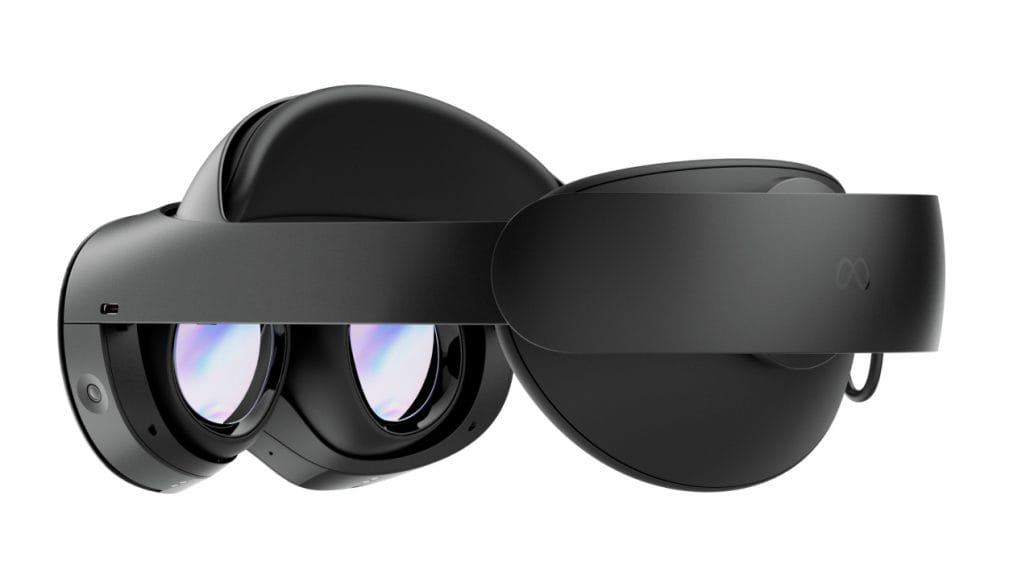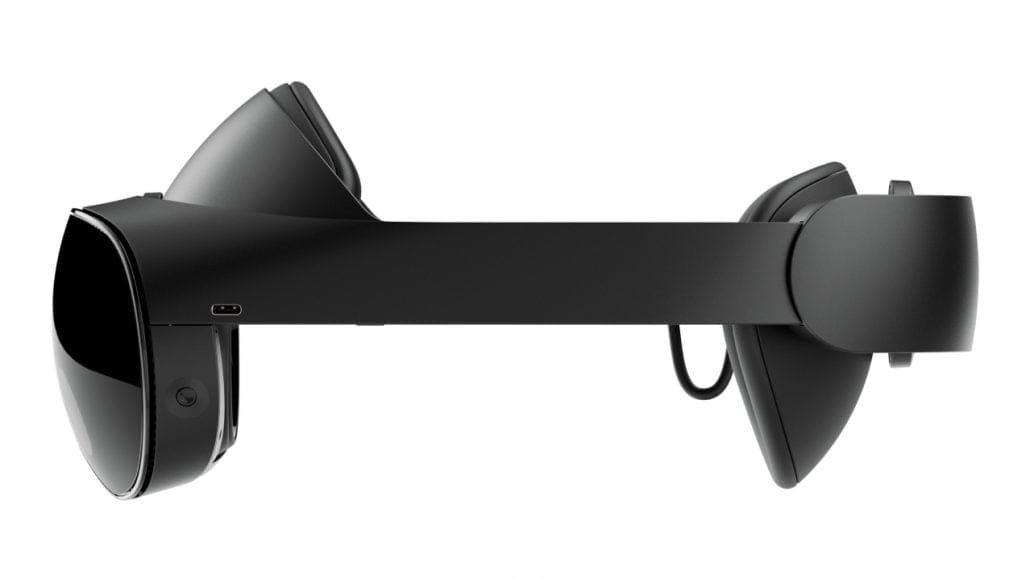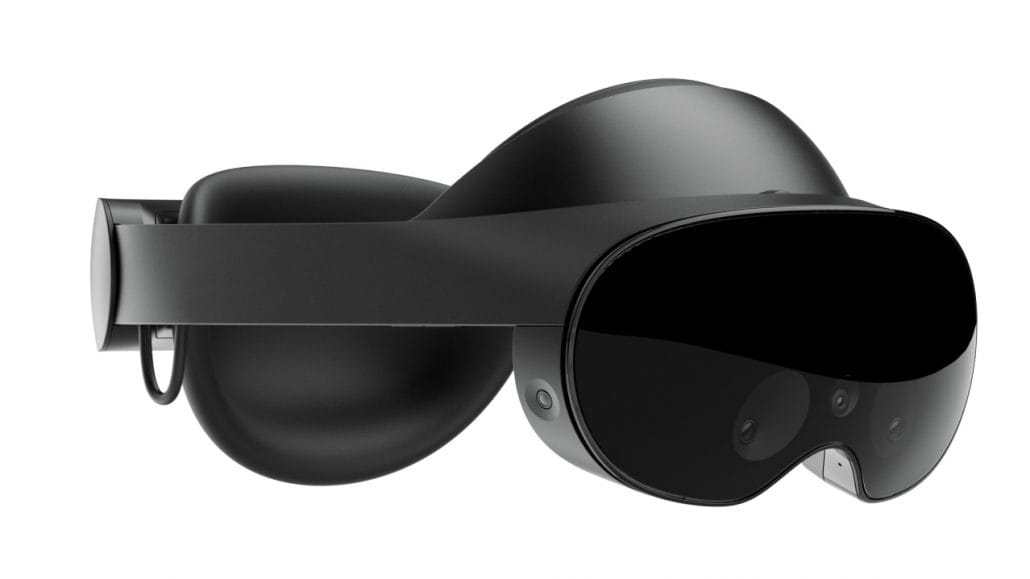End of October, Tech YouTuber Marques Brownlee published a video that showcases Meta’s new Quest Pro VR (Virtual Reality) headset. I’ve had some interesting experiences myself with previous versions of the Meta Quest and other sate of the art headsets, but to be honest, it still feels far from how the Metaverse of the future is envisioned in Steven Spielberg’s 2018 science fiction movie Ready Player One. It’s not that immersive as of yet, because of poorer than real life resolution, bad audio quality and other factors.
According to Marques the new Meta Quest Pro VR headset is a technology leap that allows for completely new virtual and augmented reality experiences that might develop into some mind blowing, but also scary future scenarios.
Quest Pro VR Headset



If there’s any company that can be positioned to bring this technology over the hump to make it a thing, then it’s Meta. But the downside of that, especially this company having possibly that much control over people and over the future of the Internet and possibly doing crazy things like like using eye tracking to make sure you see certain ads is way too much for me to want to root for it at all.
Marques Brownlee
Here’s the video followed by a complete transcript.
Transcript: Who Care About the Metaverse
[00:00:10] Somebody tell me why this was never in any of Meta’s presentations? How is me putting a phone camera in the Quest Pro headset the most compelling demo of VR I’ve seen in like the last five years. But I have some hot takes on this whole metaverse thing that I kept to myself for a little while, but I think it’s finally time to share them. So buckle up. Let’s get into it. So meta stock is down over 60% this year. Facebook’s growth has flatlined and their CEO, Mark Zuckerberg, has doubled down on this commitment to the whole metaverse thing, which they’ve continued to pour tons and tons of money into. It’s like what is going on here? But let’s just zoom out a second and start with some definitions. VR is virtual reality, which is putting the headset on and being completely immersed in a new virtual world. AR is augmented reality, which is overlaying virtual things on top of the real world. I’m going to use that a lot in this video. Those two things, though, are both particularly hard to demo. You kind of have to try it and use it to actually understand it and appreciate it. So I know there’s a lot of curiosity about VR, especially lately, and it can be kind of hard to tell if it’s like just another trend in tech, like 3D TVs, whatever happened to those, or if it’s actually the future that we’ll all be living in, like Ready Player One. Or maybe more like Wall-E. Hard to tell. [00:01:32] Either way, there’s basically one visible mega company that’s clearly pushing all their chips in on this definitely being our future. And that’s Meta, formerly known as Facebook with their CEO, Mark Zuckerberg. This guy, this guy right here. And he explained to me many times that they really believe in this metaverse thing. And he showed me all of this quest pro stuff right before it was announced on stage. So I got to form my opinions on it before the slightly more cringe worthy presentation version we’ve all seen. The metaverse might have a pretty terrible reputation already, but let’s try to take a step back, look at it objectively, like a piece of tech, shall we? [00:02:16] So like I said, VR is one of those things you kind of have to try to understand and appreciate. But also the spectrum of how much people care about the metaverse is hilarious, like all the way from not caring at all and never having tried VR in their life all the way to like serious believers, like companies hiring a Chief Metaverse officer and Metaverse being in every headline and just like a weird obsession with it. So it can be kind of hard to give a single answer to this, but I actually think it’s pretty simple. The Internet, as we have it right now, is mostly controlled by two things: ads and devices. So if you control the ads, then you’re the one connecting people to the things that they buy. That’s basically what Google does. Google’s job is to know everything they possibly can about people and then show them ads for things not just on Google search results, but all over the Internet with Google AdWords. [00:03:07] Pretty much every company in the world who does online advertising pays Google to do it for them. So for as much as we talk about like the Pixel and Google Chrome and Android on this channel, Google is at its core an ads business. And then if you control the devices people use, then you very much have control over what makes it to people’s eyeballs. Facebook has wanted to make a popular device, but they don’t make one. Trust me, they’ve tried. But now in 2022, as popular as Facebook is, they have clearly saturated the market. They’ve peaked. They’ve begun their inevitable, very slow decline. And so they’ve made their bazillions of dollars. But now with things like the iPhone adding that ask app not to track button that took a multi billion dollar chunk out of Facebook’s ads business didn’t really hurt Google as much because people still go to google.com and type in a box what they’re looking for. Google still knows a lot about people. So bottom line, bottom line is Facebook is accepting that l you know, they they dominated the early parts of the Internet and that was great. But now the slow decline has begun and they’re moving on to the next big thing. And if you could look all around at all the technologies, that could maybe be the next big thing, that one thing that keeps bubbling back up to the surface has been VR and AR. [00:04:19] And so Facebook Meta can control as much of this VR future as possible. The software, the hardware, the ads, the things that make it to people’s eyeballs, then they will regain the control and the money that they’re after. So cue them rebranding themselves to Meta and pouring billions and billions of dollars into that exact mission. Okay, so this might be kind of a hot take, but the Meta Quest pro, this headset is 1500 dollars, and I’ll explain the thinking behind that in a second. But it is actually pretty good it’s a pretty good, technologically speaking, a pretty good headset. It is much more comfortable than a lot of others I’ve tried. So they’ve split the components now between the displays and lenses in the front and speakers and buttons through the middle and then the battery at the back. It is lighter than it looks, but I think it’s more about the balance and the weight here, you can see feels like the balance point is right in the middle there, which is better. But then you put it on and you look like this. Here you go, boom. And without the blockers on the side, there is a little bit of a gap and you do have peripheral vision light coming in from the sides and not the top. Inside there is a custom Snapdragon XR two plus processor, 256 gigs of storage, 12 gigs of RAM, and then a slimmer set of displays and lenses. And then the screens inside are giving you 1920 by 1800 per eye at up to 90 FPS. [00:05:51] And it can do this decent full color pass through with the ten sensors and cameras scattered around the outside. It’s not the best pass through I’ve ever seen, but it does work and it lets you feel like you’re in a normal environment. Plus, there’s these new touch pro controllers which have cameras and sensors of their own, and they all charge on a single dock through some pins, which you’ll be doing often because sadly, the headset does just have like a one and a half hour battery life when unplugged. But then there’s also a suite of sensors on the inside, facing your eyes, facing your face for face tracking. Right now, I’m looking at an alien face, but a little bit more interesting than that is the alien face is in real time showing what the headset sees my face doing. And so every expression that I make, every little facial movement, the eye movements, the every it’s it’s kind of a lot of the little things too, like the little muscles on your face that move when you talk and you make little microexpressions. So if I was in a virtual world and trying to convey emotions to another person, then they would see. Everything. That’s pretty cool. VR and AR both work pretty well through this headset, but at the end of the day, it still is a pretty chunky. It’s a pretty big headset. It doesn’t fold down either. So if you want to travel with it, you need like a bag or a backpack. [00:07:14] This version might not be tempting to you. Zuckerberg keeps telling me, you know, people buy a new $2,000 machine as their desktop computer all the time, and this is maybe a replacement for that someday. But this might not be tempting to you, but theoretically, in a couple of years, a new version of it is much, much smaller, closer to like a regular pair of glasses and then even further down the road, another version is even smaller. Maybe a lightweight like Google Glass used to be back in the day. And then eventually it’s an incredible, actually portable piece of tech. And so theoretically, if you pour enough money and talent into something, it can become amazing. Which leads me to my next point. This is the real question here. Every time I see a new VR headset pop up, whether it’s this like Pico Pro headset or the Meta Quest Pro or anything like that, the question is always like, is this VR thing really actually going to be the future? Like, it’s cool, it’s tech and it works and everything, but are we actually going to be spending meaningful time in VR at some point? And the answer, of course, depends on who you ask. Obviously, I feel like I’ve noticed the younger the person is that you talk to, the more likely they are to want to give VR a chance or to try it more often. But if you ask Meta, if you ask anyone in leadership at Meta, the answer is yes, absolutely, 100%. [00:08:39] This is the future that we are all going to be living in using VR all the time. Metaverse for sure. Now, of course, they have to believe in that because the whole company is a huge ship barreling in that exact direction, but also watching the presentation of everything at the Meta Connect keynote. As miserable and awkward as it was, the more you watch, the more it kind of crystallizes their whole plan for me. Basically. Step one Think of all the things people normally do on the Internet. Step two make those things in VR and then pour tons of money into them. And then that’s kind of the whole plan. If you get the time and you actually get to watch through that presentation, it happens over and over again where basically they realize that people do certain things in real life and then they want to bring that thing into VR. Oh, you’d like to do this. Here’s a VR version. Oh, you do this other thing. Here’s a VR version over and over again. And ideally for them anyway, convincing people to use the VR version just will become a matter of making the VR version really, really good. Hopefully better than the real life version. And that’s where I think my hot take comes in, which is that some of these VR applications are actually scary good and starting to look better than the non VR version. And for Meta, if they can get enough of these things to be real, then they’ll be making this metaverse thing happen. [00:10:02] Gretchen stop trying to make metaverse happen. It’s not going to happen. [00:10:06] Okay? So some are easier than others, right? Gaming. Yeah. We’ve got some good games already in VR. Now we’ve got to work on getting more like a better variety of games, better fidelity, etc. more immersion, and pouring money into this ecosystem will entice developers to rapidly improve games and make better games, which is awesome. But there’s more to life than just games. What else do people do all day in 2022? Zoom calls. Okay, perfect. Yes, they’ve got Zoom calls, but better. They’ve built an entire virtual meeting room experience where you can do video conferencing in VR with other people. So, you know, if some of your friends or coworkers don’t have VR headsets, that’s fine. They’ll show up as a floating video feed in the metaverse. But now with a bunch of people in meetings, you can talk to the people around you, you can do breakout meeting rooms instantly, really good immersive presentations, etc.. Now, currently, as you can tell, these are all using these avatars and these I think are bad. They’re pretty cringy. I mean, you can customize them, of course, with a bunch of different things, different hair and features and outfits and piercings, etc., which is kind of neat. Sure. But you still end up feeling like a metaverse meeting is just a bunch of me characters from Nintendo Wii. But it’s very much a stopgap because we also saw that Meta announced this live Avatar demo that looked absolutely wild to me. You can essentially use your phone to take a scan of yourself and then the headset takes that and puts a photorealistic version of you into the virtual environment, complete with that face tracking and eye tracking and everything that we talked about before. [00:11:38] That is super next level. So you can imagine now, instead of just a Zoom call with coworkers, a really good meeting is a bunch of people from all over the world, all in one room with all the advantages of the eye contact and relative audio positioning and being able to, like, lean over to the person next to you and say something really quietly just to them. All of this is stuff that you can’t really do in a Zoom call. And so just replace these weird avatars with the hyper realistic ones and they might be on to something. But that’s just meetings. That’s not even that much time. What else do people do? Maybe they just work remotely, period. Sure. Okay. Then they’ll build this whole metaverse, this whole virtual office building for people to work in. So if they work all over the world in different countries, they can all collaborate in the same spaces. But even the first thing I showed in this video, which is just simply working on your computer, which is the thing that many people do for many hours a day, and the Quest Pro has native Mac support that let me project my Mac screen onto these multiple huge virtual screens so you can take a huge triple monitor setup wherever you go. Basically, you can just take this headset with you and do way more with fairly high resolution that can again get better with time and more money. [00:12:47] They’ve poured money into Microsoft to bring Office 365 and Word and Excel and everything into work rooms natively. They’ve poured money into Accenture to give them like thousands and thousands of VR headsets to get those people to use the metaverse to work virtually all the time. Basically, Meta can and will dump a ton of money into this because that’s all they’re doing right now. There’s like a common trope that like if you want to make a bunch of money as a startup right now, just make a virtual reality tech startup in some way and you will eventually level up enough to just get acquired by Meta. It’s no wonder Chief Metaverse officers became a thing that became a way to like, make it seem like you might get acquired by Meta. But that brings us to the last thing. [00:13:37] There’s really only one problem that I have with all of this, which is that one company controlling the entire foundation of this second generation Internet, if you want to call it that. This metaverse is a terrible idea. So this comes down to meta wanting as much control over this future as possible. Facebook was built on someone else’s foundation. They want to build the next foundation and then be the ones responsible for everything that grows up on top of it the work rooms, the games, the experiences, everything, so that they’re pretty visibly pouring as much money into it now as possible to get as far ahead as possible. [00:14:17] Now, plenty of other companies are are developing and making really cool VR stuff. Now, along those same lines, don’t get me wrong, there’s the Pico headset I just showed you. There are stuff from Google, stuff from I think we all expect in the next year or so Apple to finally unveil their VR headset, which I think will make media a little bit nervous because Apple will for sure make sure that’s the best one for iPhone users. But Meta has already made so many connections and built so many technologies and bought up so many VR companies and VR studios that it sucks. But it’s like if there’s any company that can be positioned to bring this technology over the hump to make it a thing, then it’s meta. But the downside of that, especially this company having possibly that much control over people and over the future of the Internet and possibly doing crazy things like like using eye tracking to make sure you see certain ads is way too much for me to want to root for it at all. I’ve said it before, but when companies truly compete, that is actually when we win, when there’s actually real incentive to get better because competition makes them better, that’s when we get better stuff. But man, Mark’s Metaverse money might make the meta thing much more mainstream. Or maybe not. Thanks for watching. Catch you guys later. Peace.Credits
- Main picture courtesy of Barbara Zandoval




Schreibe einen Kommentar